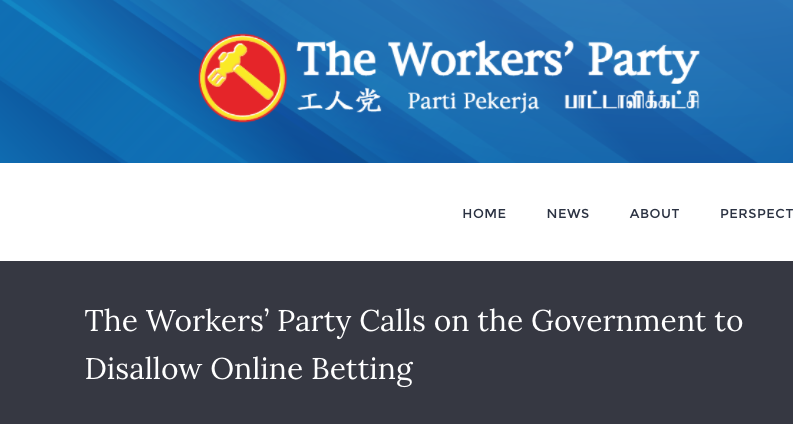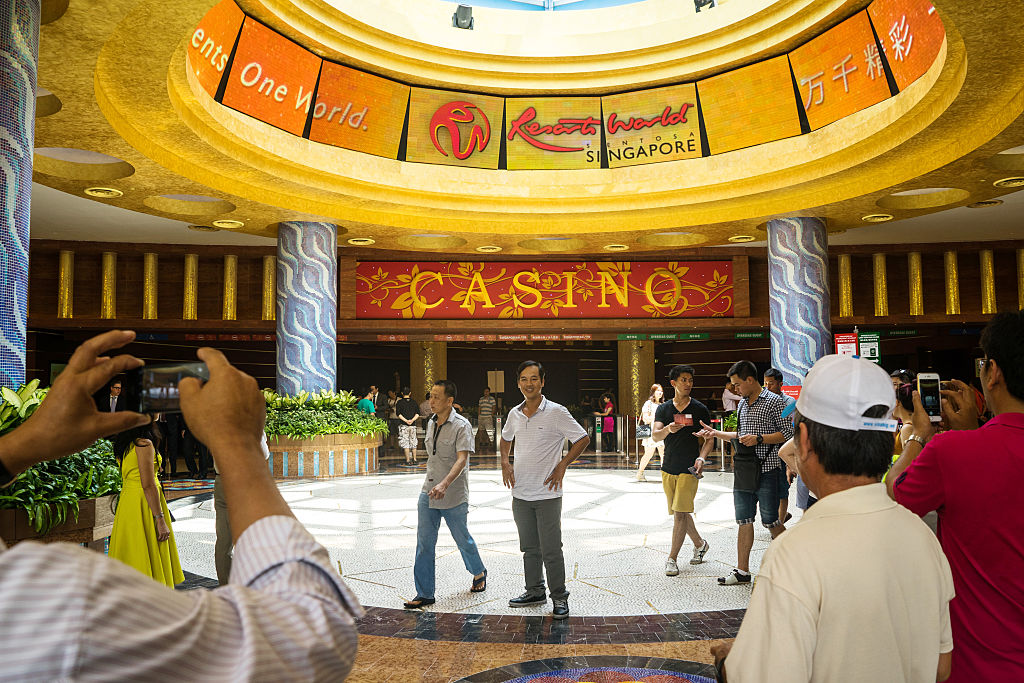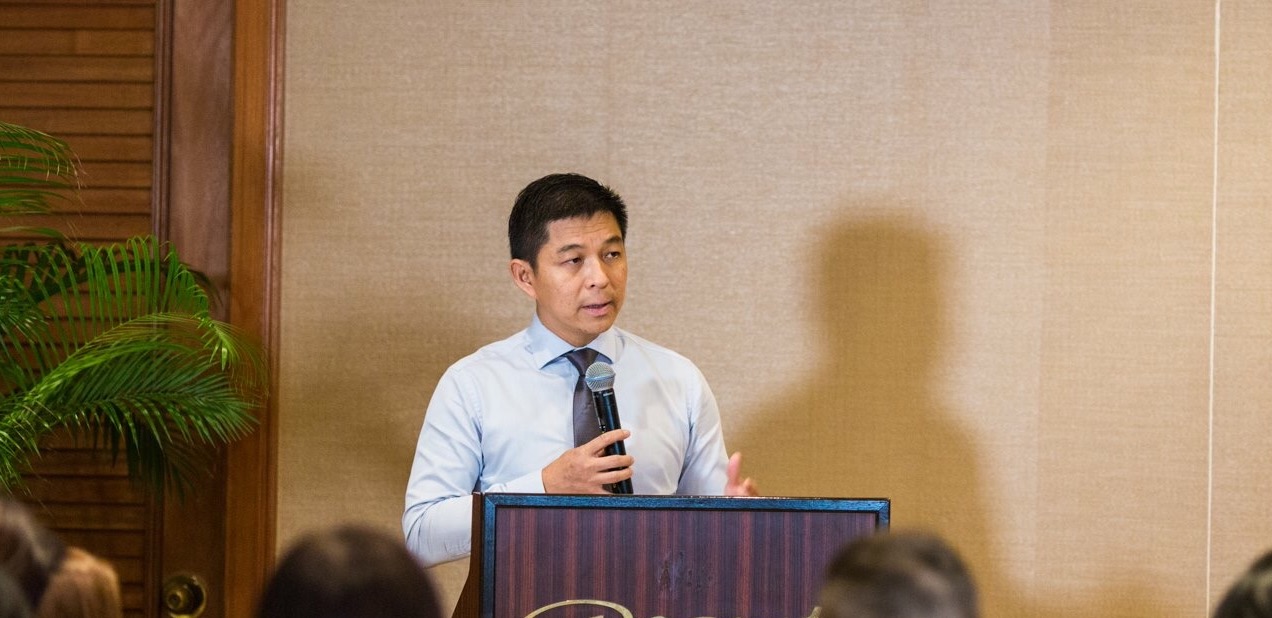Here's a dilemma for the government: How does it adequately explain a moral issue that has both law and order and social implications?
Especially when many government folks think that the moral thing to do — a complete ban — is not necessarily the most efficient and constructive way to curb or address the issue at hand.
Perhaps it's what led to this strange situation:
Last week (Sep 29), the Ministry of Home Affairs announced that Singapore Pools and the Singapore Turf Club would be exempt from the Remote Gambling Act (RGA).
But it was Minister of Social and Family Development Tan Chuan-Jin who somehow found himself fronting a media briefing on the issue this week.
In case you've been too busy gambling to notice, here's what you missed over the past week:
The government has allowed Singapore Pools and the Turf Club to launch online gambling services in the next two months.
The Workers’ Party (WP) has come out quite strongly in opposition to legalising any form of online gambling in Singapore (Sep 27), reminding everyone of what they said in parliament two years ago about it.
The Christians have also spoken up — the National Council of Churches Singapore (NCSS), which represents more than 250 churches, appealed to the Government in a statement issued Wednesday (Oct 5) to review its decision.
It said "the government is sending confusing and conflicting signals" because how can we ban online gambling but yet allow Turf Club and Singapore Pools, our two biggest betting umbrellas, to do so?
But hold your horses. Let's get something out of the way first: this isn't something that the government snuck up on us or was passed quietly without consultation with anyone. There was a parliamentary debate on the issue two years ago.
Having said that, the government's stance on the RGA is still making some of us scratch our heads. Here are three reasons why:
1. What made the government lose hope in its present legislative approach, just two years after passing it? The data provided so far seems unconvincing.
When the RGA bill was introduced two years ago in parliament, S Iswaran, Second Minister for Home Affairs, was fronting it. So one would take it to be a law and order issue, and rightly so.
Iswaran noted that the bill has two key objectives:
1) to tackle the law and order issues associated with remote gambling; and
2) to protect young persons and other vulnerable persons from being harmed or exploited by remote gambling.
—> Law and order.
The latest data provided by MHA in support of exemption: More than 120 people were arrested for remote gambling offences since February 2015.
Also, 4,000 people (39 of whom were caught in Singapore) were arrested by an Interpol-led operation during the Euro 2016 football tournament period. (From this very unscientific sample size, this means Singapore's gamblers apparently make up almost 1 per cent of that global total. But as we stress, unscientific. Nonetheless.)
—> Also law and order.
But Iswaran mentioned two years ago that a combination of legislation, enforcement and public education is needed:
"We prohibit gambling, unless it is specifically allowed for by way of a stringently-regulated exemption or licence. We will adopt a similar approach to remote gambling. We aim to achieve this policy intent through a combination of new legislation, stepped up enforcement, and enhanced public education and engagement.
So is the latest decision to exempt operators an acknowledgement that this is no longer just a law and order issue, or that the online gambling problem is worsening and cannot be controlled?
Because the data we currently have is limited, to say the least — more than 120 people arrested for online gambling, 39 apprehended during the Euros. Surely this can't be the basis of the latter conclusion.
Minister Tan's explanation on Channel NewsAsia on Oct 6 focused more on the need for social safeguards though:
"The problem (remote gambling) exists today, with or without this managed space. Even with our bans and blocks, people find ways to go around it. We will continue to endeavour to continue to increase the friction, but we know that that overall space is just growing and given the profile of internet penetration in Singapore, there is a very real risk that people who really do desire to be online to game will find alternatives, despite everything that we have done. So, having a managed space allows us at least to provide a safer alternative.
I know that ideally we would prefer not to have this space at all. But I can’t wish a problem away, because this set of laws, on its own, the bans and the blocks, will not be enough to prevent people from being there. If I have an alternative that may be controlled and tightly-managed, I think we would perhaps allow a space for people who are seeking the online gaming experience to be in that space, but at least we could manage them, and we can begin to intervene in a much more constructive way to help when problems begin to arise."
This is all well and good, but what data is the government relying on to make the call to switch gears?
For instance, Pritam Singh pointed out two years ago that "the NCPG consultation exercise report on the regulation of remote gambling saw some stakeholders calling on the Government to commission more local research on remote gambling to study the nature and extent of remote gambling in Singapore". Was this additional local research done?
More data is useful on a few levels.
For instance, if we are unable to assess whether online gambling has become a bigger issue (either through arrests or increased numbers of Singaporeans being counselled for gambling addiction), how will the government decide whether they should continue to exempt Singapore Pools and Turf Club when their three-year licenses are up?
Also, there is much to consider if Singapore Pools and Turf Club's online gambling revenues were to increase year-on-year? Does this information mean that the initiative to legalise online gambling has been a success — in turn, what does that mean? — or does that mean that the problem of online gambling is worsening?
2. With WP firmly in the "no to online gambling" camp, will Parliament debates on the issue enlighten or confuse us further next week?
 Screenshot from WP website
Screenshot from WP website
WP's position on the complete ban to online gambling is clear and categorical — "we oppose the granting of exemptions to any organisation to operate remote and online betting services and we call on the government to reject these applications".
Unlike their call for Paralympic medallists to receive the same prize awards as their able-bodied counterparts, WP's stand on online gambling has a much stronger track record — its position on the matter was stated in its General Election 2015 manifesto.
Three WP parliamentarians — Pritam Singh, Png Eng Huat and Yee Jenn Jong — have also spoken about the matter and largely argued against the exemption two years ago.
Which means that the debate about online gambling might become politicised, as both sides of the aisle put in concerted effort to score political and moral points.
On the WP side, we hope to hear suggestions of alternative policy solutions that can be carried out to combat the rise of online gambling if there is a total ban on online gambling. On the PAP side, we hope to hear a bit more in terms of data points that led to their change of mind.
3. Maybe the reason why we are confused is because it is difficult for the government to declare politically what one of its justifications is — the allowance of some form of controlled online gambling gives them the ability to monitor, identify and help problem gamblers.
 Visitors take photographs in front of the casino at Resorts World Sentosa, operated by Genting Singapore Plc., in Singapore, on Thursday, March 26, 2015. Photographer: Sanjit Das/Bloomberg via Getty Images
Visitors take photographs in front of the casino at Resorts World Sentosa, operated by Genting Singapore Plc., in Singapore, on Thursday, March 26, 2015. Photographer: Sanjit Das/Bloomberg via Getty Images
Currently, the government probably has some information on local gamblers at our two casinos.
In fact, one of the main roles of the NCPG is to "execute Casino Exclusions and Visit Limits in accordance with the Casino Control Act and within prevailing policies on casino social safeguards".
At the moment, such controls don't exist at the Singapore Pools or the Turf Club, though, where pretty much anyone can place a bet, as long as you look like you're old enough. At most, you get carded, but no personal details are recorded.
In fact, during the Parliamentary debate two years ago, Chan Chun Sing, then-Minister for Community Development, Youth and Sports, hinted at the advantages of being able to monitor problem gamblers at our casinos:
"It is a difficult topic. Many of you have spoken of the fear that if we ban it totally, it will create a substitution effect whereby they go to other means to gamble. Yes, those concerns are valid. Some of you have spoken up about how it would be driven underground. Yes, again, those are valid concerns.
Some of you asked: can it work for a determined gambler? Would he be able to use technology to bypass the controls? Again, we know that for a very determined person, he may be able to do so. But we are still nevertheless determined to do what we can to block the advertisement and also the promotion of such activities in our system.
Then, there is this thing that we need to ask ourselves. As some of you have mentioned, we know that this issue will not go away and that some people will fall to temptation. Our issue from the social safeguard perspective is what is the best way for us to manage this issue? How can we best help our people should they fall and to help them to get out of the situation that they are in? If we know that, there is at least a way for us to help them. If we do not know at all, either because they substituted their habits through other means or if they go underground, then it is also very difficult or, if not, impossible for us to monitor and render help where necessary.
Arguably, even for the terrestrial casino operators now, we have some ability to monitor those who go there, and that ability allows us to translate it into help for those who need help. The question is not whether we can ban it or not ban it. The question is not so much as to whether we want to ban it or not want to ban it. The question is which is the best way for us to manage this very difficult problem where we know that some people will have such a habit. How can we detect them? How can we render help and as far as possible protect their families from falling into harm’s way. That is the real challenge.
So, what are some of the social safeguards that we can envisage for these exempt operators? From MSF’s perspective, it is much better than what the situation we are in today. Today, anybody, literally anybody, can open an account without much prior checks. Tomorrow, if anybody desires to be exempted, we are able to set in place the hurdles required for them to cross before we even consider them." (Our emphases in bold)
If that is really one of the key reasons the government has for doing this, it may not be the worst idea to experiment with a system of ultra-regulated online gambling for three years before we revisit it again.
But do take note of this: it is three years. It's not a blank cheque for the government to act like a big brother in all matters.
Top photo from Tan Chuan-Jin's Facebook page.
If you like what you read, follow us on Facebook and Twitter to get the latest updates.
If you like what you read, follow us on Facebook, Instagram, Twitter and Telegram to get the latest updates.
